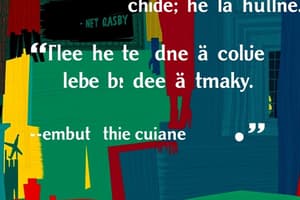Podcast
Questions and Answers
What does juxtaposition involve in literature?
What does juxtaposition involve in literature?
- The description of a character's appearance
- The repetition of similar phrases or themes
- The use of metaphors to express feelings
- The placement of two contrasting ideas together (correct)
What is the connotative meaning of the term 'fool' in the context provided?
What is the connotative meaning of the term 'fool' in the context provided?
- A person who is clever and insightful
- A child full of innocence
- Someone who is beautiful and uneducated (correct)
- A wise individual with experience
How does the author use the words 'enchanted' and 'repelled' to convey emotional contrast?
How does the author use the words 'enchanted' and 'repelled' to convey emotional contrast?
- By using them interchangeably to create confusion
- By placing them in isolation to reflect individual emotions
- By contrasting them to illustrate a character's indecision
- By juxtaposing them to highlight positive and negative feelings (correct)
What does Daisy hope for her daughter, according to her quote?
What does Daisy hope for her daughter, according to her quote?
Why is connotation considered significant in literature?
Why is connotation considered significant in literature?
What does denotation refer to?
What does denotation refer to?
Which of the following words carries a negative connotation based on the examples given?
Which of the following words carries a negative connotation based on the examples given?
In The Great Gatsby, what is implied by Nick describing his house as an 'eyesore'?
In The Great Gatsby, what is implied by Nick describing his house as an 'eyesore'?
What is the significance of connotation in the context of The Great Gatsby?
What is the significance of connotation in the context of The Great Gatsby?
What connotation is associated with the term 'bootlegger' as used by Tom in The Great Gatsby?
What connotation is associated with the term 'bootlegger' as used by Tom in The Great Gatsby?
What does the use of the word 'benediction' in relation to Mr. Wolfshiem imply?
What does the use of the word 'benediction' in relation to Mr. Wolfshiem imply?
How does the author use the terms 'enchanted' and 'repelled' in Nick's description?
How does the author use the terms 'enchanted' and 'repelled' in Nick's description?
Which of the following statements correctly describes the connotation of the sun in the narrator's description?
Which of the following statements correctly describes the connotation of the sun in the narrator's description?
Flashcards
Juxtaposition
Juxtaposition
Placing two contrasting things side-by-side to highlight their differences.
Connotation
Connotation
The implied meaning or feeling associated with a word, beyond its literal definition.
Denotation
Denotation
The literal dictionary definition of a word.
Connotative word choice
Connotative word choice
Signup and view all the flashcards
Evoke emotion in the reader
Evoke emotion in the reader
Signup and view all the flashcards
Negative Connotation in "The Great Gatsby"
Negative Connotation in "The Great Gatsby"
Signup and view all the flashcards
Positive Connotation in "The Great Gatsby"
Positive Connotation in "The Great Gatsby"
Signup and view all the flashcards
Juxtaposition of Connotations in "The Great Gatsby"
Juxtaposition of Connotations in "The Great Gatsby"
Signup and view all the flashcards
Importance of Connotation in "The Great Gatsby"
Importance of Connotation in "The Great Gatsby"
Signup and view all the flashcards
Connotation & Time Period in "The Great Gatsby"
Connotation & Time Period in "The Great Gatsby"
Signup and view all the flashcards
Connotation & Character Development in "The Great Gatsby"
Connotation & Character Development in "The Great Gatsby"
Signup and view all the flashcards
Study Notes
Connotation and Denotation in The Great Gatsby
- Denotation: The literal meaning of a word, found in a dictionary.
- Connotation: The cultural, historical, and societal meaning of a word; evokes ideas or feelings. Can be positive, negative, or neutral.
Examples from The Great Gatsby
- Nick: "My own house was an eyesore, but it was a small eyesore." (Negative connotation; Nick implies his house is ugly.)
- Tom: "...I picked him for a bootlegger the first time I saw him." (Negative connotation; Tom labels Gatsby as someone who illegally provides alcohol.)
- Benediction: Denotation is the closing of a religious ceremony.
- Mr. Wolfshiem: "...raised his hand in a sort of benediction." (Negative connotation; Mr. Wolfshiem's dismissal of Gatsby.)
- Narrator: "...the sun, which as it sank lower, seemed to spread itself in benediction over the vanishing city..." (Positive connotation; personifies the sun setting, evoking a beautiful image.)
- Nick: "I was within and without simultaneously enchanted and repelled by the inexhaustible variety of life." (Juxtaposition of emotions; "enchanted" is positive, "repelled" is negative, demonstrating inner conflict.)
- Daisy: "I hope she'll be a fool--that's the best thing a girl can be in this world, a beautiful little fool." (Negative connotation of fool, societal perspective that beauty is more important than intelligence for girls in the era. Shows societal expectations.)
Importance of Connotation
- Authors use connotation to convey messages and evoke emotions in readers, crucial for engaging with the text.
Studying That Suits You
Use AI to generate personalized quizzes and flashcards to suit your learning preferences.




